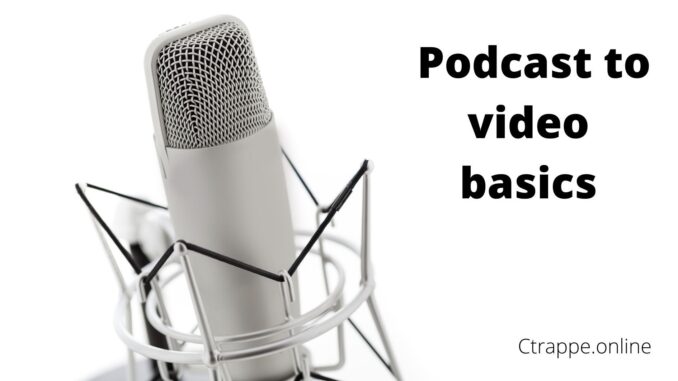
Estimated read time: 5 minutes
Subscribe to Blog via Email
Enter your email address to subscribe to this blog and receive notifications of new posts by email.
Join 70,767 other subscribers
One way to promote your podcast is to turn clips from the podcast into video-type clips – aka audiograms.
Podcast expert and host Max Branstetter says the following about audiograms:
“Audiograms are a clever way to translate the audio-first world of podcasting to the visual-first world of social media. You’re creating a visual representation of what was discussed in your podcast episode, complete with any graphics and text you want, a waveform that clearly demonstrates “this has sound,” and of course the minute-or-less audio snippet you’d like to share out. They give the viewer a little taste of the episode much better than sharing out a standard image does.”
“The downside is many people scroll through social media with the sound off, but seeing the waveform still helps to give context this is part of a conversation you can listen to. It provides a chance for your podcast to be a bit more memorable.”
Read and listen next: Max shares how to start your own podcast
How audiograms look – on social media
Basically I grabbed an audio clip and then turned it into a video file with an image showing. I uploaded that video to different networks like Twitter, Facebook and Instagram.
I liked the new way of promoting the podcast and it certainly stood out in the social media stream. Since videos usually auto play there was movement – albeit slight – as my audiograms showed in somebody’s feed.
Read next: Sharing your podcast to Instagram with a link
How audiograms look – on websites
I also started using audiograms on websites within articles. Here’s an article that I wrote that discusses how marketing teams should use insights. The audiograms make a nice visual break and of course readers can also play them.
How to produce audiograms
There are several ways. A few examples of workflow.
I simply signed up for an account and added my podcast’s RSS feed. Now when new episodes are published, Audioburst creates a sampling of audio clips. You can edit them directly in Audioburst or export and trim on your phone.
Audioburst lists your episodes and there are drop downs for clips by episode.
You can also edit directly in the program and export.
It’s easy to add an image to the post directly in the program. Keep in mind that the bottom third or so is covered up. I used my cover art with both of the people on the podcast on it. I created the image in Canva.
I haven’t personally used this software but Max has. Here’s what he has to say about it:
My favorite site is Wavve (wavve.co). Before I do this, I find a minute-or-less audio snippet from my latest episode and save that as a separate file in Audacity (where I edit the podcast).
Then, Wavve makes it very easy to design your audiogram, add in the waveform, add in the progress bar, upload your audio snippet, add in captions, and download.
They’re continually making it better with new features, and their founder sends out a super helpful newsletter with updates and advice. I then use Buffer to get the clip from my computer to my phone, where I can then post via my phone to my favorite social media platforms.
Max offered one more tool:
Another popular option for audiograms is Headliner, which is now integrated with Libsyn – one of the most popular podcast hosting platforms.
Listen to Lately’s Kate Bradley Chernis on the podcast: How to be less boring with your content
Are audiograms worth it as part of your podcast?
Yes. I think so. They are a nice way to break up articles and allow you to stand out on social media.
At the end of the day it comes back to the return on the effort (ROE). For example, if those audiograms can get you a few hundred views it might be a fantastic tool. If they only get you 10 it might not be worth the time it takes you to create them. But the website integration is one way to get more bang out of it as well.
As I mentioned in “Content Performance Culture” the exact numbers depend on the size of your audience.
At the very least, audiograms are worth trying for a few episodes.
Kate, the Lately CEO, put it this way:
“It’s not just a matter of putting content online for folks to digest at will. It’s about binge marketing it to them, so that not a drop of gold gets wasted.”
She continues: “First, when creating longform content like podcasts, for example, STOP thinking of it as a one-time use. Program what you produce to be as evergreen as possible. Plan for it to be legacy content so that whether somebody consumes it today or in five years, there are still magical nuggets that shine.”
“Second, once your podcast has been published, mine it for that freakin’ gold! Transcribe every episode. Find the golden quotes throughout. There will be hundreds. Use ALL of them. Match up the audio or video clips with each quote and turn into droves of social posts to continuously drive traffic back to the original overtime, FOREVER.”

Leave a Reply